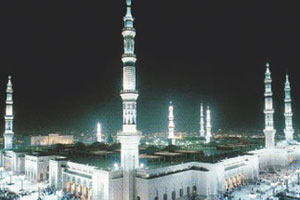The current configuration of the Arab world is quite complex, as it includes the countries where most of the population speaks the Arabic language and the inhabitants of countries that have some form of Arabic as their mother tongue.
The Arab world is predominantly Muslim, that is, they profess Islam. However, there are minorities such as the Copts in Egypt and Ethiopia, who profess Christianity.
Currently, Arabs are concentrated in Africa (over 143 million) and Asia (over 127 million), between the Persian Gulf in the East and the Atlantic Ocean in the west. There is a group of Arab countries called the League of Arab States, formed in 1945 by seven countries, and which now takes in Saudi Arabia, Algeria, Bahrain, Comoros, Djibouti, Egypt, United Arab Emirates, Iraq, Jordan, Kuwait, Lebanon, Libya, Morocco, Mauritania, Oman, Sudan, Tunisia and Yemen. Furthermore, there are Arab minorities in Chad, Turkey, Iran and Israel, among other countries.
Islam
This monotheistic religion was founded by the Prophet Muhammad in Arabia in the 7th century. The term Islam means submission and indicates the believer’s subjugation to the will of his God, Allah (Allâh), the creator of the world.
Islam extended throughout Asia and, to a lesser extent, Africa and Europe.
It is estimated there are now more than 800 million Muslims, living mainly in the Near and Middle East and the rest in Asia and Africa; around 80% are not Arabs.
The life of a Muslim is based on the precepts of the Koran, revealed to Muhammad by Allah, and the Sunna or tradition. Islamic law or Sharia establishes five pillars or fundamental duties: first, the shahada, «There is no other god but Allah, and Muhammad is his Prophet»; second, ritual prayer five times a day; third, fasting during Ramadan (which lasts a month); fourth, the pilgrimage to Mecca at least once in a Muslim’s lifetime; and fifth, the ritual giving of alms or zakat.
The majority of modern Islamic states have maintained the Sharia in private law, but have adopted Western codes for public law. Regarding the organisation of the State, political power is subject to Islamic law.
Presently, the majority of Muslims are Sunni or Sunnites. They are orthodox, following the Koran and the Sunna (related to Muhammad and his companions).
Another important group, although a minority, is the Shiites who consider that the descendants of Ali ibn Abu Talib (Muhammad’s cousin and faithful follower) are the only legitimate leaders.
Arabia
Arab civilization arose in Arabia or Yazirat-al-Araba, part of the Arabic peninsula, located in the extreme southwest of Asia, forming part of the Near East.
With an area of around 2.7 million km2, it is bounded to the north by Jordan and Iraq; by the Arabian Sea to the south; by the Persian and Oman Gulfs to the east, and by the Red Sea to the west. At present it encompasses Saudi Arabia, Bahrain, the United Arab Emirates, Kuwait, Oman, Qatar and Yemen.
Despite being mostly desert, Arabia is economically one of the most important regions in the world, as there are enormous underground petrol reserves. The region’s greatest oil reserves, in descending order, are found in Saudi Arabia, the United Arab Emirates, Kuwait, Oman and Qatar.
A Brief History of the Arabs
Arabia was historically populated by wandering tribes of Bedouins. There were only small trading centres as Yatrib (that would later become Medina) and Mecca.
In the 7th Century, these tribes united, inspired by Muhammad’s preaching.
When the prophet died, a series of powerful caliphs led Islam, extending its territory and power. Under the Umayyad Caliphate, established in 661, expansion continued into the Near East and Northern Africa and the empire reached its greatest extent. The capital was Damascus, the present capital of Syria.
Later, the Abbasid Caliphate was founded in 750. Its seat was in Baghdad, now the capital of Iraq.
In the 11th Century, the progressive invasions of the Seljuk Turks divided the Empire. The regions were governed by different dynasties.
During the 13th Century, the Mongols also invaded the Empire and took Baghdad in 1258. During the 14th and 15th Centuries, the Ottoman Turks took over all the territories that had been ruled by the Arabs.
In the 19th Century, Europeans began to occupy Arab territories. However, from the decade of the 1920s onwards they gained their independence.








